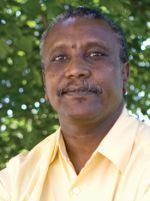SPLM Yasir Arman after peace studying at Iowa State
By Virginia Zantow
June 19, 2007 (AMES, Iowa) — Yasir Arman has spent 21 years – as long as many college students have been alive – fighting for a cause he believes in.

This summer, he is staying at Iowa State under the guidance of his educational consultant, John House, a tutor in the Intensive English and Orientation Program.
House shares an apartment with Arman and helps him with his English skills, in addition to familiarizing him with American culture and coordinating meetings with officials and others Arman wishes to meet.
“He’s a very good learner,” House said. “He’s very interested to know everything, and I’m amazed at his retention of facts.”
Arman studied law at a university in Sudan, and afterward he immediately joined the SPLM, never having the opportunity to enter his profession.
“I am taking this time to re-link myself with academics and I am trying to develop my skills in different ways, and maybe at a later stage I was thinking also of doing something, given my years of experience at the SPLM, if I could do something or write anything because of my experience,” Arman said.
Arman is not enrolled in any courses at Iowa State, but he is taking classes at the IEOP.
Arman said he spends much of his time at the library, reading as much as he can.
Arman is not the first Sudanese official to stay at Iowa State. The man who founded the SPLM, the late John Garang, received his Ph.D. in economics from Iowa State.
In 2003, two years before the peace agreement between the SPLM and the government was signed, Garang and two other political leaders came here to develop their English and computer skills, while observing different aspects of American life.
Before the peace agreement was achieved, Arman spent years “in the bush” as he puts it, in warfare because he believed in the idea of a “new Sudan,” which Garang spoke much of and the SPLM wished to realize.
Although Arman did not grow up surrounded by military conflict and violence, he said he was aware of the inequalities in Sudan’s government, especially as a student.
The Sudanese government is largely Arab and Muslim, and, for a long time, the government discriminated against non-Arabs and people of other religions.
Although Arman is a Muslim himself and from northern Sudan – the movement is generally associated with the south’s desire for greater recognition – he was drawn to the ideas of equality Garang spoke of.
Arman eventually became a commander in the Sudan People’s Liberation Army, the military branch of the SPLM, and he performed several jobs outside his battlefield duties, including acting as an official spokesman of the SPLM to the media.
The long civil war Arman was involved in is not to be confused with the present crisis in Darfur, which was brought about by other militias. Arman said the Darfur situation is a tragedy, and said he appreciates Americans’ concern for the region.
He said during his experience in the war he became exposed to the difficulties of the common man and saw many of the different cultures that make up his country.
“Of course, during the wartimes, war is an exceptional phenomenon,” Arman said. “It is a very difficult phenomena. It has a terrible impact on human societies.”
Arman said he lost many “precious friends” during the war, people he described as historical heroes who stood firm against injustice.
After the war, he helped draft some parts of the peace agreement, later to join parliament for a time.
The SPLM, Arman said, could still advance in its commitment to respecting human rights and equality.
During the war, he said the militia accepted child soldiers for a short time, but that practice was no longer in place when the war ended.
Although the fighting between his political party and the Sudanese government has stopped, Arman said other militias still bring conflict to his country.
Arman said he would like students to know that Sudan is a great country with a great history, and the country is friendly to the United States. He said it was only “messed up” because of the misjudgments and practices of the ruling class.
His country’s embassy needs support, he said, as the government is in the process of transformation, and Sudanese leaders work toward more respect for human rights and equality, which Arman said there is still a great need for.
“My main dream is to have a new Sudan,” Arman said.
“Not the Sudan of today, a Sudan of misery and wars and human rights violations. My dream is of a new Sudan, which respects human rights, in which every citizen feels he belongs to that country.”
(Iowa State Daily)
